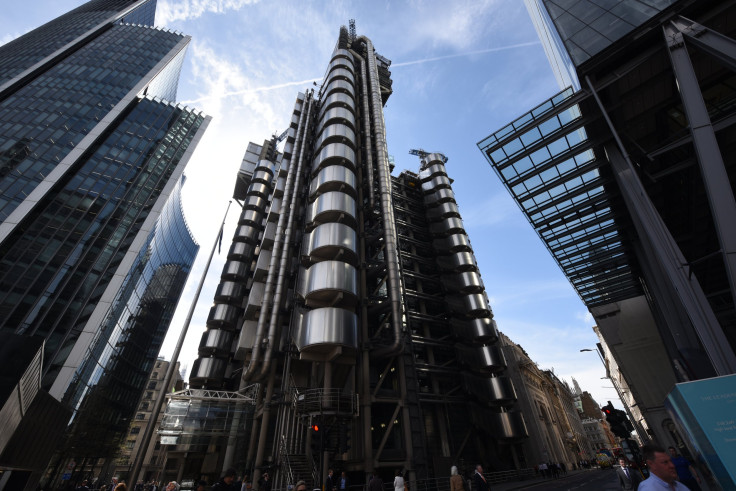Coronavirus Repercussions: Global Insurance Industry Stands To Lose At Least $200 Billion This Year

KEY POINTS
- Lloyd’s itself expects to pay out between $3 billion and $4.3 billion
- Lloyd’s paid out $4.7 billion after the Sept. 11 attacks
- Lloyd's paid out a total of $4.8 billion following Hurricanes Harvey, Irma and Maria in 2017.
Lloyd’s of London estimated that the global insurance industry will suffer losses of more than $200 billion this year from the effects of the coronavirus pandemic.
"The estimated 2020 underwriting losses covered by the industry as a result of Covid-19 are approximately $107 billion," Lloyd’s said. "In addition, unlike other events, the industry will also experience falls in investment portfolios of an estimated $96 billion, bringing the total projected loss to the insurance industry to $203 billion."
Lloyd’s itself, which as an insurance market (not an insurance company) pays out to insurers impacted by disasters, said it expects to pay out between $3 billion and $4.3 billion to insurance firms to help them deal with the pandemic-related claims.
Lloyd’s paid out $4.7 billion after the Sept. 11 attacks; and paid out a total of $4.8 billion following Hurricanes Harvey, Irma and Maria in 2017.
Lloyd’s said 15% of this year’s payouts will cover the U.K. with the remainder covering the rest of the globe.
Almost one-third of insurance losses are expected to arise from the cancellation or postponement of major events, including the Tokyo Olympics.
However, total losses from this year could be even greater if lockdowns extend into the next quarter.
“Lloyd’s believes that once the scale and complexity of the social and economic impact of COVID-19 is fully understood, the overall cost to the global insurance non-life industry is likely to be far in excess of those historical events [like hurricanes, terror attacks, floods, etc.],” the London-based insurance market said. “Importantly, these natural catastrophes were geographically contained events, occurring over the course of hours and days -- vastly different in nature to the global, systemic and longer-term impact of Covid-19.”
Lloyd’s Chief Executive John Neal said: “What makes COVID-19 unique is not just the devastating continuing human and social impact, but also the economic shock. Taking all those factors together will challenge the [insurance] industry as never before, but we will keep focused on supporting our customers and continuing to pay claims over the weeks and months ahead.”
Neal added: "The global insurance industry is paying out on a very wide range of policies to support businesses and people affected by COVID-19.”
Neal further said that although earnings at insurance firms will be severely hurt this year, these losses should not lead to a wave of insolvencies. “Those syndicates [at Lloyd’s] are recapitalizing as required,” he said. “We feel [they are] in a good position.”
But Neal expects the industry to eventually undergo consolidation.
British insurer Prudential PLC said on Thursday that its Asia insurance sales -- on an annualized premium equivalent basis -- plunged by 24% in the first quarter to $986 million, due largely to weak sales in mainland China and Hong Kong.
In the U.K., some small businesses have accused insurers, including Hiscox, of denying them payments over business disruptions, but insurers asserted that most small business policies do not cover the pandemic.
Neal noted that the U.K. domestic property sector represents less than 2% of the Lloyd's market, and that "any valid claims should be paid.”
Some businesses in Britain are particularly irate over Hiscox, which has largely refused to pay out business interruption claims related to the pandemic.
Earlier this month more than 300 U.K. policyholders have joined an entity called Hiscox Action Group which has retained legal counsel to sue the insurer.
Hiscox has maintained that pandemic-related losses are excluded from its business interruption policies.
“Like others in the industry, Hiscox U.K.’s core small commercial package policies do not provide cover for business interruption as a result of the general measures taken by the U.K. government in response to a pandemic,” Hiscox said in late April.
Mark Killick, part of the Action Group, responded: “Hiscox thought they could get away without paying but that is not going to happen. We have appointed top legal counsel, we will be fully funded, and we are going to force Hiscox to do the right thing and honor its obligations.”
Simon Ager, another Action Group member, declared: “Hiscox’ behavior has been disgraceful. The policy wording is clear and unambiguous, and the insurance has clearly been triggered. In refusing to pay out in a shoddy attempt to preserve its own balance sheet, Hiscox is putting the future of hundreds of British businesses at risk.”
© Copyright IBTimes 2025. All rights reserved.





















